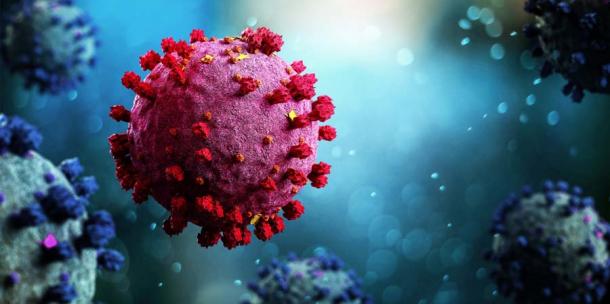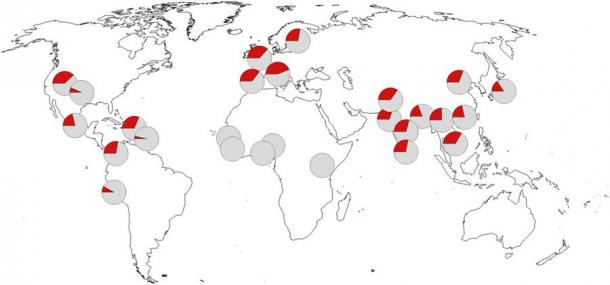Back in 2020 researchers claimed that they had discovered a Neanderthal Covid gene which decreased our ability to fight the virus SARS-CoV-2 that causes Covid-19. Now a new research project in Japan has identified a group of three genes in human DNA, inherited from Neanderthals, that assist the body’s cells while attempting to defeat invading viruses. These genes can reduce the risk of developing severe Covid-19 “by around 20%.”
Identifying the “Neanderthal Covid-19 Resistant Genes”
The team of researchers from Japan’s Okinawa Institute of Science and Technology Graduate University ( OIST) and the Max Planck Institute for Evolutionary Biology in Germany found that interbreeding between modern humans and Neanderthals meant we inherited the gene around 60,000 years ago. The scientists have now determined that having this gene can help you fight SARS-CoV-2, which impacts people in different ways ranging from no symptoms at all to respiratory failure and death.
Last year in an Ancient Origins news article I discussed the findings of Professors Svante Pääbo, who leads the Human Evolutionary Genomics Unit at OIST in Japan, and his colleague Hugo Zeberg. The pair of genetic scientists published a controversial report in Nature claiming “the greatest genetic risk factor so far identified, doubling the risk to develop severe Covid-19 when infected by the virus, was inherited from Neanderthals.” The paper actually said the Neanderthal gene “increases the risk of developing severe Covid-19.”
Now, the same group of genes has been found to be beneficial to around 20% of people and it can help reduce their risk of becoming seriously ill and being hospitalized with Covid-19. This new research has just been published in PNAS.

The recent research shows that the gene dubbed the “Neanderthal Covid gene” can impact our ability to develop severe Covid-19 symptoms. ( Production Perig / Adobe Stock)
22% Lower Risk of Severe Covid-19 Symptoms
The same pair of scientists have now published a new study based on the findings of a 2020 study by Genetics of Mortality in Critical Care ( GenOMICC). This UK based project analyzed the genome sequences of “2,244 people who developed severe COvid-19” and they identified additional genetic regions on four chromosomes that impact how individuals respond to the virus when they become infected. The research shows human genes “almost identical to those found in three Neanderthals – a ~50,000-year-old Neanderthal from Croatia, and two Neanderthals, one around 70,000 years old and the other around 120,000 years old, from southern Siberia.”
The scientists are clear that conditions such as diabetes and obesity greatly amplify the effects of Covid-19. However, “surprisingly,” this second genetic factor influences Covid-19 outcomes in the opposite direction to the first genetic factor, “providing protection rather than increasing the risk to develop severe Covid-19.” For those who like to keep abreast of developments in DNA sciences, this Neanderthal variant was discovered on chromosome 12. And to be accurate, having this gene reduces the risk of requiring intensive care after Covid-19 infection by about 22%.

Geographic distribution of the Neanderthal Covid gene which can reduce the risk of developing severe Covid-19. ( OpenStreetMap / 1000 Genomes Project )
How Neanderthal Genetic Variants Affect Us Today
Attempting to understand how this Neolithic genetic variant affects Covid-19 outcomes , the research team looked at three genes located in a newly identified region. Known as OAS , the body produces these defensive enzymes upon viral infection and they stimulate other enzymes that attack and degrade the viral genomes lodged within infected cells. In an Okinawa Institute of Science and Technology (OIST) Graduate University press release Professor Pääbo explained that “it’s quite amazing that despite Neanderthals becoming extinct around 40,000 years ago, their immune system still influences us in both positive and negative ways today.”
In their new study the researchers also analyzed how the newly discovered Neanderthal-like genetic variants “changed in frequency after ending up in modern humans some 60,000 years ago.” Professor Pääbo commented that the enzymes encoded by the Neanderthal variant “are more efficient” at reducing the chance of severe consequences to SARS-CoV-2 infections. Furthermore, the results of the new study show the Neanderthal variant “increased in frequency after the last Ice Age and then increased in frequency again during the past millennium.”
Bad Neanderthal Gene Is Not a Japanese “Thing” at All
The fact that the Neanderthals had developed this gene over 60,000-years-ago suggested to the researchers that it must have been beneficial also in the past, “maybe during other disease outbreaks caused by RNA viruses,” said Professor Pääbo.” The gene is present today in about half of people living outside Africa, and in around 30% of people in Japan.
Returning for a moment to last year’s paper which identified a Neanderthal gene that posed “a major health risk.” The Japanese scientists must have been somewhat relieved to discover in their new study that this negative genetic variant inherited from Neanderthals, is almost non-measurable in modern Japanese populations.
Top image: New research has found that a group of genes, dubbed Neanderthal covid genes, reduce the risk of developing severe Covid-19 by around 20% and have been inherited from Neanderthals. Source: Bjorn Oberg / Karolinska Institutet
By Ashley Cowie
Related posts:
Views: 0
 RSS Feed
RSS Feed
















 February 20th, 2021
February 20th, 2021  Awake Goy
Awake Goy  Posted in
Posted in  Tags:
Tags: 
















